Report on Business Ethics and Sustainability in Automobile Industry
VerifiedAdded on 2023/04/11
|22
|4671
|197
Report
AI Summary
This report investigates the key ethics and sustainability challenges facing the automobile industry, offering recommendations for the next 50 years. It addresses environmental problems like air pollution and resource depletion, employee health and safety concerns, and corporate scandals. The report emphasizes the need for innovative strategies to reduce environmental impact and improve corporate governance. It discusses eco-innovation, environmental performance, the integration of suppliers and assemblers, and the importance of addressing urbanization, climate change, and population growth. The report also highlights the role of regulations and the necessity for companies to adopt ethical and sustainable practices to ensure long-term competitiveness and responsible operations.
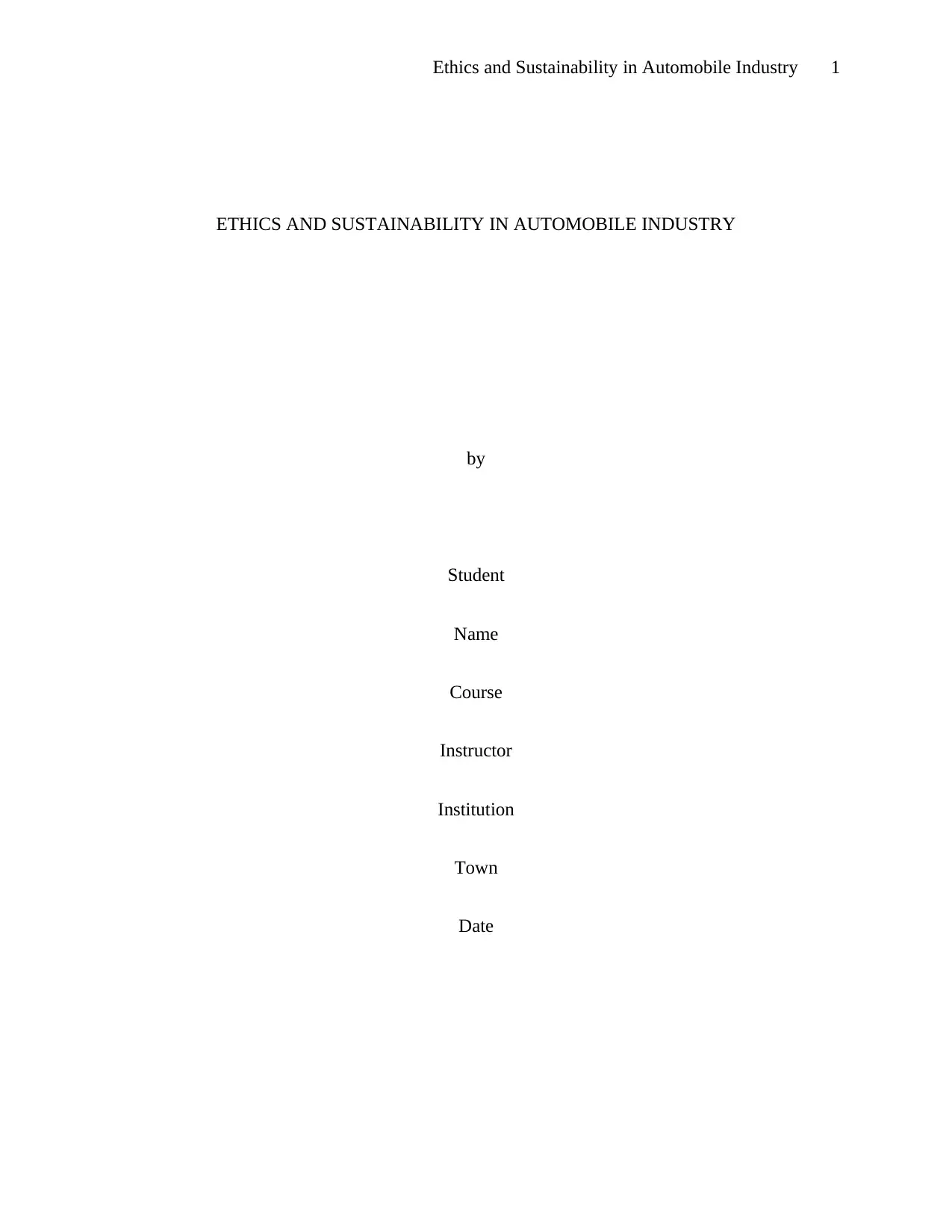
Ethics and Sustainability in Automobile Industry 1
ETHICS AND SUSTAINABILITY IN AUTOMOBILE INDUSTRY
by
Student
Name
Course
Instructor
Institution
Town
Date
ETHICS AND SUSTAINABILITY IN AUTOMOBILE INDUSTRY
by
Student
Name
Course
Instructor
Institution
Town
Date
Paraphrase This Document
Need a fresh take? Get an instant paraphrase of this document with our AI Paraphraser
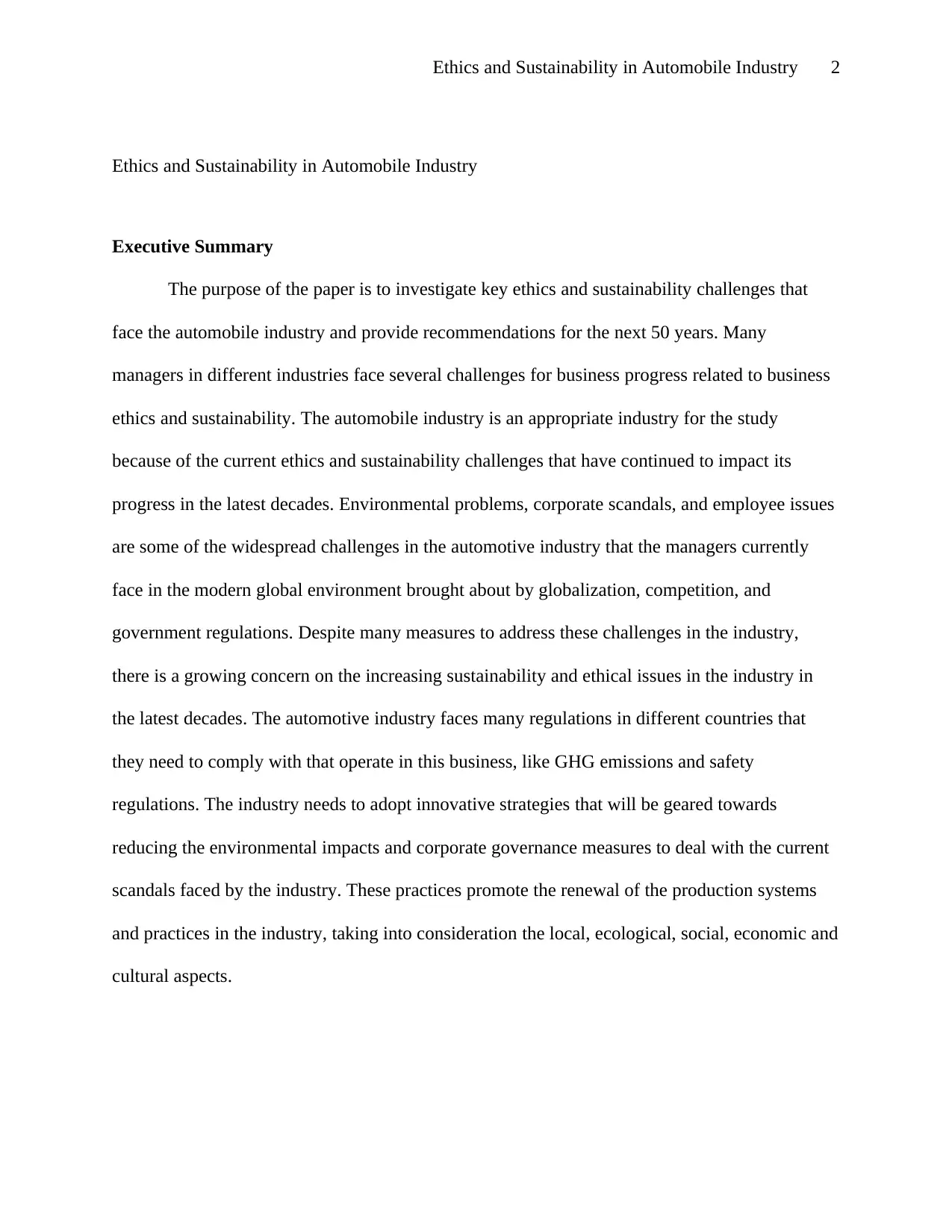
Ethics and Sustainability in Automobile Industry 2
Ethics and Sustainability in Automobile Industry
Executive Summary
The purpose of the paper is to investigate key ethics and sustainability challenges that
face the automobile industry and provide recommendations for the next 50 years. Many
managers in different industries face several challenges for business progress related to business
ethics and sustainability. The automobile industry is an appropriate industry for the study
because of the current ethics and sustainability challenges that have continued to impact its
progress in the latest decades. Environmental problems, corporate scandals, and employee issues
are some of the widespread challenges in the automotive industry that the managers currently
face in the modern global environment brought about by globalization, competition, and
government regulations. Despite many measures to address these challenges in the industry,
there is a growing concern on the increasing sustainability and ethical issues in the industry in
the latest decades. The automotive industry faces many regulations in different countries that
they need to comply with that operate in this business, like GHG emissions and safety
regulations. The industry needs to adopt innovative strategies that will be geared towards
reducing the environmental impacts and corporate governance measures to deal with the current
scandals faced by the industry. These practices promote the renewal of the production systems
and practices in the industry, taking into consideration the local, ecological, social, economic and
cultural aspects.
Ethics and Sustainability in Automobile Industry
Executive Summary
The purpose of the paper is to investigate key ethics and sustainability challenges that
face the automobile industry and provide recommendations for the next 50 years. Many
managers in different industries face several challenges for business progress related to business
ethics and sustainability. The automobile industry is an appropriate industry for the study
because of the current ethics and sustainability challenges that have continued to impact its
progress in the latest decades. Environmental problems, corporate scandals, and employee issues
are some of the widespread challenges in the automotive industry that the managers currently
face in the modern global environment brought about by globalization, competition, and
government regulations. Despite many measures to address these challenges in the industry,
there is a growing concern on the increasing sustainability and ethical issues in the industry in
the latest decades. The automotive industry faces many regulations in different countries that
they need to comply with that operate in this business, like GHG emissions and safety
regulations. The industry needs to adopt innovative strategies that will be geared towards
reducing the environmental impacts and corporate governance measures to deal with the current
scandals faced by the industry. These practices promote the renewal of the production systems
and practices in the industry, taking into consideration the local, ecological, social, economic and
cultural aspects.
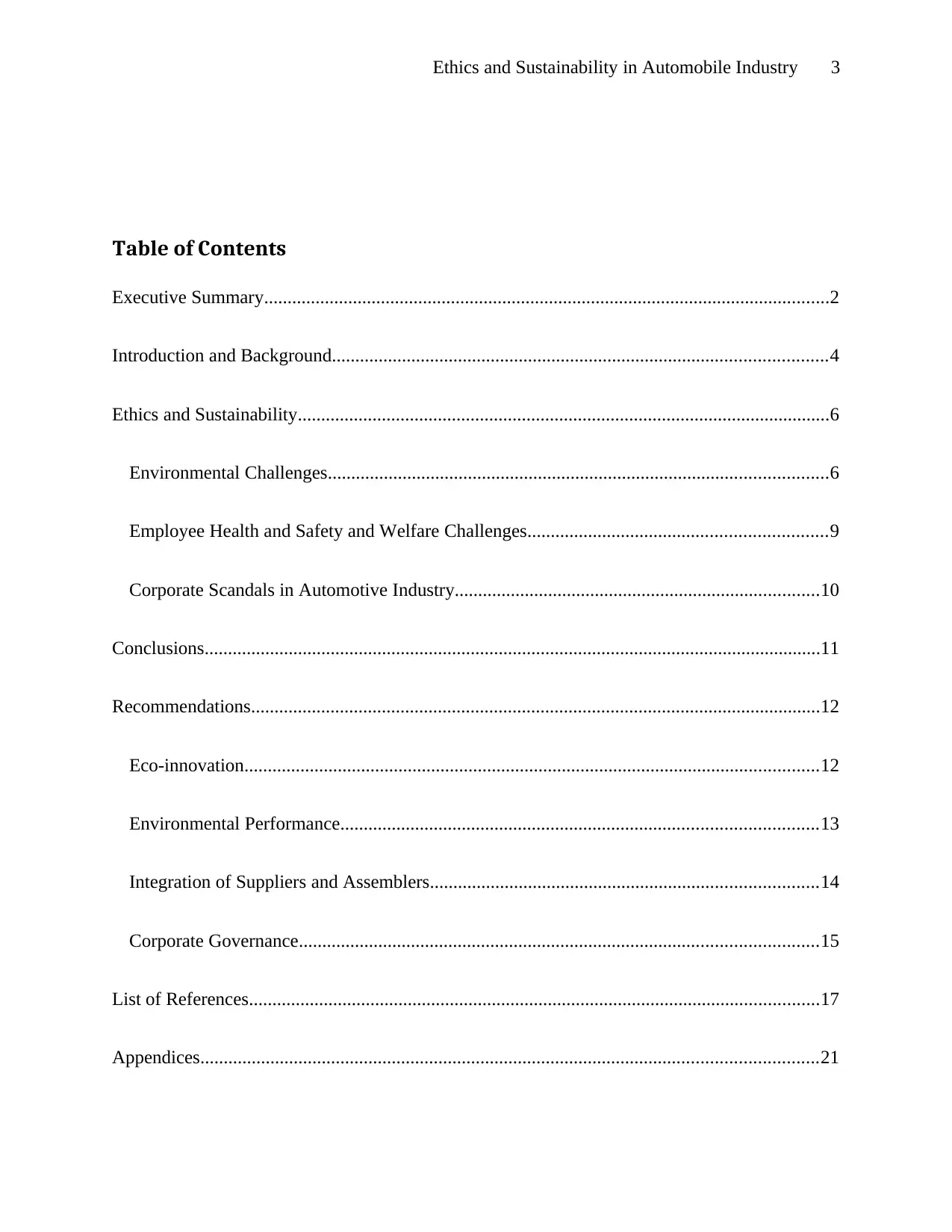
Ethics and Sustainability in Automobile Industry 3
Table of Contents
Executive Summary.........................................................................................................................2
Introduction and Background..........................................................................................................4
Ethics and Sustainability..................................................................................................................6
Environmental Challenges...........................................................................................................6
Employee Health and Safety and Welfare Challenges................................................................9
Corporate Scandals in Automotive Industry..............................................................................10
Conclusions....................................................................................................................................11
Recommendations..........................................................................................................................12
Eco-innovation...........................................................................................................................12
Environmental Performance......................................................................................................13
Integration of Suppliers and Assemblers...................................................................................14
Corporate Governance...............................................................................................................15
List of References..........................................................................................................................17
Appendices....................................................................................................................................21
Table of Contents
Executive Summary.........................................................................................................................2
Introduction and Background..........................................................................................................4
Ethics and Sustainability..................................................................................................................6
Environmental Challenges...........................................................................................................6
Employee Health and Safety and Welfare Challenges................................................................9
Corporate Scandals in Automotive Industry..............................................................................10
Conclusions....................................................................................................................................11
Recommendations..........................................................................................................................12
Eco-innovation...........................................................................................................................12
Environmental Performance......................................................................................................13
Integration of Suppliers and Assemblers...................................................................................14
Corporate Governance...............................................................................................................15
List of References..........................................................................................................................17
Appendices....................................................................................................................................21
⊘ This is a preview!⊘
Do you want full access?
Subscribe today to unlock all pages.

Trusted by 1+ million students worldwide
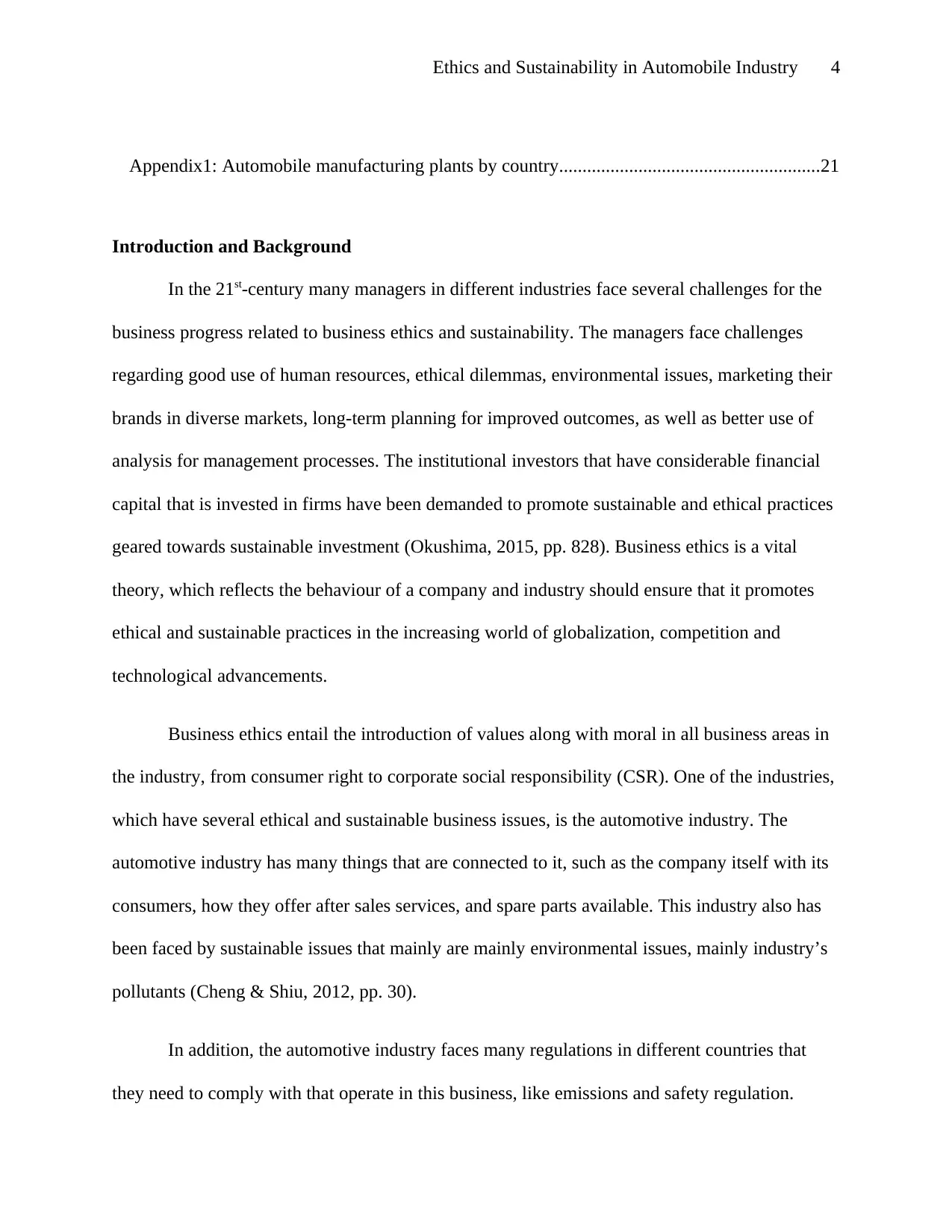
Ethics and Sustainability in Automobile Industry 4
Appendix1: Automobile manufacturing plants by country........................................................21
Introduction and Background
In the 21st-century many managers in different industries face several challenges for the
business progress related to business ethics and sustainability. The managers face challenges
regarding good use of human resources, ethical dilemmas, environmental issues, marketing their
brands in diverse markets, long-term planning for improved outcomes, as well as better use of
analysis for management processes. The institutional investors that have considerable financial
capital that is invested in firms have been demanded to promote sustainable and ethical practices
geared towards sustainable investment (Okushima, 2015, pp. 828). Business ethics is a vital
theory, which reflects the behaviour of a company and industry should ensure that it promotes
ethical and sustainable practices in the increasing world of globalization, competition and
technological advancements.
Business ethics entail the introduction of values along with moral in all business areas in
the industry, from consumer right to corporate social responsibility (CSR). One of the industries,
which have several ethical and sustainable business issues, is the automotive industry. The
automotive industry has many things that are connected to it, such as the company itself with its
consumers, how they offer after sales services, and spare parts available. This industry also has
been faced by sustainable issues that mainly are mainly environmental issues, mainly industry’s
pollutants (Cheng & Shiu, 2012, pp. 30).
In addition, the automotive industry faces many regulations in different countries that
they need to comply with that operate in this business, like emissions and safety regulation.
Appendix1: Automobile manufacturing plants by country........................................................21
Introduction and Background
In the 21st-century many managers in different industries face several challenges for the
business progress related to business ethics and sustainability. The managers face challenges
regarding good use of human resources, ethical dilemmas, environmental issues, marketing their
brands in diverse markets, long-term planning for improved outcomes, as well as better use of
analysis for management processes. The institutional investors that have considerable financial
capital that is invested in firms have been demanded to promote sustainable and ethical practices
geared towards sustainable investment (Okushima, 2015, pp. 828). Business ethics is a vital
theory, which reflects the behaviour of a company and industry should ensure that it promotes
ethical and sustainable practices in the increasing world of globalization, competition and
technological advancements.
Business ethics entail the introduction of values along with moral in all business areas in
the industry, from consumer right to corporate social responsibility (CSR). One of the industries,
which have several ethical and sustainable business issues, is the automotive industry. The
automotive industry has many things that are connected to it, such as the company itself with its
consumers, how they offer after sales services, and spare parts available. This industry also has
been faced by sustainable issues that mainly are mainly environmental issues, mainly industry’s
pollutants (Cheng & Shiu, 2012, pp. 30).
In addition, the automotive industry faces many regulations in different countries that
they need to comply with that operate in this business, like emissions and safety regulation.
Paraphrase This Document
Need a fresh take? Get an instant paraphrase of this document with our AI Paraphraser
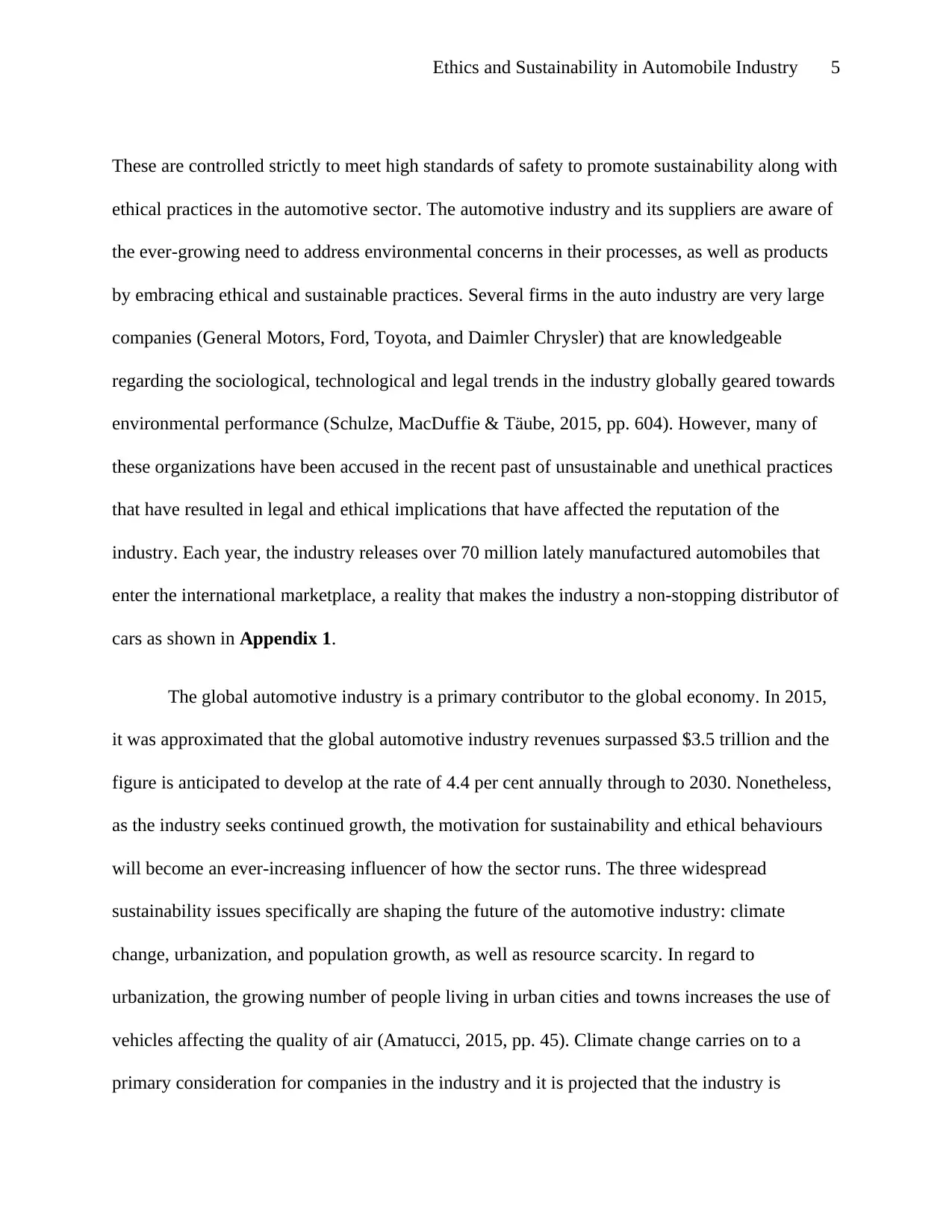
Ethics and Sustainability in Automobile Industry 5
These are controlled strictly to meet high standards of safety to promote sustainability along with
ethical practices in the automotive sector. The automotive industry and its suppliers are aware of
the ever-growing need to address environmental concerns in their processes, as well as products
by embracing ethical and sustainable practices. Several firms in the auto industry are very large
companies (General Motors, Ford, Toyota, and Daimler Chrysler) that are knowledgeable
regarding the sociological, technological and legal trends in the industry globally geared towards
environmental performance (Schulze, MacDuffie & Täube, 2015, pp. 604). However, many of
these organizations have been accused in the recent past of unsustainable and unethical practices
that have resulted in legal and ethical implications that have affected the reputation of the
industry. Each year, the industry releases over 70 million lately manufactured automobiles that
enter the international marketplace, a reality that makes the industry a non-stopping distributor of
cars as shown in Appendix 1.
The global automotive industry is a primary contributor to the global economy. In 2015,
it was approximated that the global automotive industry revenues surpassed $3.5 trillion and the
figure is anticipated to develop at the rate of 4.4 per cent annually through to 2030. Nonetheless,
as the industry seeks continued growth, the motivation for sustainability and ethical behaviours
will become an ever-increasing influencer of how the sector runs. The three widespread
sustainability issues specifically are shaping the future of the automotive industry: climate
change, urbanization, and population growth, as well as resource scarcity. In regard to
urbanization, the growing number of people living in urban cities and towns increases the use of
vehicles affecting the quality of air (Amatucci, 2015, pp. 45). Climate change carries on to a
primary consideration for companies in the industry and it is projected that the industry is
These are controlled strictly to meet high standards of safety to promote sustainability along with
ethical practices in the automotive sector. The automotive industry and its suppliers are aware of
the ever-growing need to address environmental concerns in their processes, as well as products
by embracing ethical and sustainable practices. Several firms in the auto industry are very large
companies (General Motors, Ford, Toyota, and Daimler Chrysler) that are knowledgeable
regarding the sociological, technological and legal trends in the industry globally geared towards
environmental performance (Schulze, MacDuffie & Täube, 2015, pp. 604). However, many of
these organizations have been accused in the recent past of unsustainable and unethical practices
that have resulted in legal and ethical implications that have affected the reputation of the
industry. Each year, the industry releases over 70 million lately manufactured automobiles that
enter the international marketplace, a reality that makes the industry a non-stopping distributor of
cars as shown in Appendix 1.
The global automotive industry is a primary contributor to the global economy. In 2015,
it was approximated that the global automotive industry revenues surpassed $3.5 trillion and the
figure is anticipated to develop at the rate of 4.4 per cent annually through to 2030. Nonetheless,
as the industry seeks continued growth, the motivation for sustainability and ethical behaviours
will become an ever-increasing influencer of how the sector runs. The three widespread
sustainability issues specifically are shaping the future of the automotive industry: climate
change, urbanization, and population growth, as well as resource scarcity. In regard to
urbanization, the growing number of people living in urban cities and towns increases the use of
vehicles affecting the quality of air (Amatucci, 2015, pp. 45). Climate change carries on to a
primary consideration for companies in the industry and it is projected that the industry is
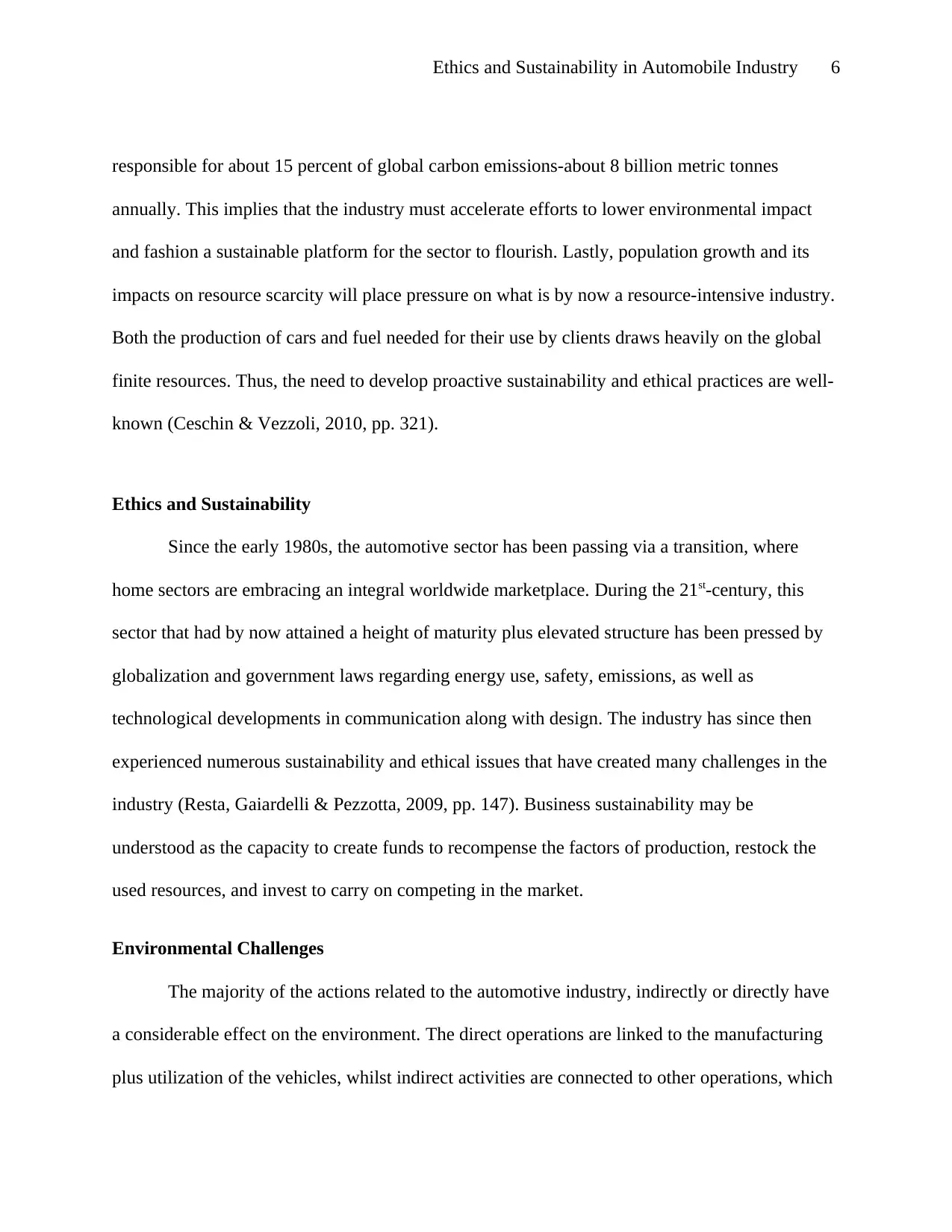
Ethics and Sustainability in Automobile Industry 6
responsible for about 15 percent of global carbon emissions-about 8 billion metric tonnes
annually. This implies that the industry must accelerate efforts to lower environmental impact
and fashion a sustainable platform for the sector to flourish. Lastly, population growth and its
impacts on resource scarcity will place pressure on what is by now a resource-intensive industry.
Both the production of cars and fuel needed for their use by clients draws heavily on the global
finite resources. Thus, the need to develop proactive sustainability and ethical practices are well-
known (Ceschin & Vezzoli, 2010, pp. 321).
Ethics and Sustainability
Since the early 1980s, the automotive sector has been passing via a transition, where
home sectors are embracing an integral worldwide marketplace. During the 21st-century, this
sector that had by now attained a height of maturity plus elevated structure has been pressed by
globalization and government laws regarding energy use, safety, emissions, as well as
technological developments in communication along with design. The industry has since then
experienced numerous sustainability and ethical issues that have created many challenges in the
industry (Resta, Gaiardelli & Pezzotta, 2009, pp. 147). Business sustainability may be
understood as the capacity to create funds to recompense the factors of production, restock the
used resources, and invest to carry on competing in the market.
Environmental Challenges
The majority of the actions related to the automotive industry, indirectly or directly have
a considerable effect on the environment. The direct operations are linked to the manufacturing
plus utilization of the vehicles, whilst indirect activities are connected to other operations, which
responsible for about 15 percent of global carbon emissions-about 8 billion metric tonnes
annually. This implies that the industry must accelerate efforts to lower environmental impact
and fashion a sustainable platform for the sector to flourish. Lastly, population growth and its
impacts on resource scarcity will place pressure on what is by now a resource-intensive industry.
Both the production of cars and fuel needed for their use by clients draws heavily on the global
finite resources. Thus, the need to develop proactive sustainability and ethical practices are well-
known (Ceschin & Vezzoli, 2010, pp. 321).
Ethics and Sustainability
Since the early 1980s, the automotive sector has been passing via a transition, where
home sectors are embracing an integral worldwide marketplace. During the 21st-century, this
sector that had by now attained a height of maturity plus elevated structure has been pressed by
globalization and government laws regarding energy use, safety, emissions, as well as
technological developments in communication along with design. The industry has since then
experienced numerous sustainability and ethical issues that have created many challenges in the
industry (Resta, Gaiardelli & Pezzotta, 2009, pp. 147). Business sustainability may be
understood as the capacity to create funds to recompense the factors of production, restock the
used resources, and invest to carry on competing in the market.
Environmental Challenges
The majority of the actions related to the automotive industry, indirectly or directly have
a considerable effect on the environment. The direct operations are linked to the manufacturing
plus utilization of the vehicles, whilst indirect activities are connected to other operations, which
⊘ This is a preview!⊘
Do you want full access?
Subscribe today to unlock all pages.

Trusted by 1+ million students worldwide
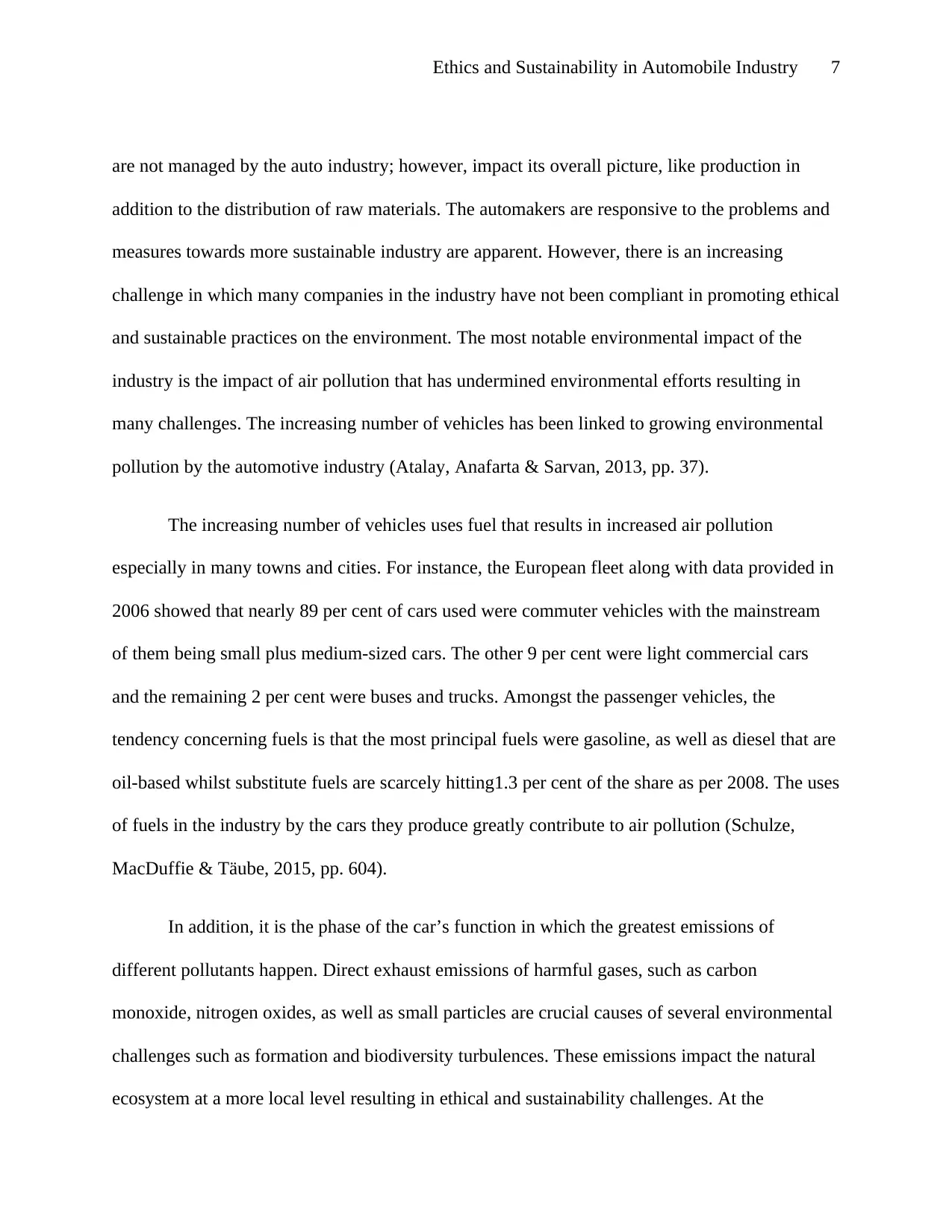
Ethics and Sustainability in Automobile Industry 7
are not managed by the auto industry; however, impact its overall picture, like production in
addition to the distribution of raw materials. The automakers are responsive to the problems and
measures towards more sustainable industry are apparent. However, there is an increasing
challenge in which many companies in the industry have not been compliant in promoting ethical
and sustainable practices on the environment. The most notable environmental impact of the
industry is the impact of air pollution that has undermined environmental efforts resulting in
many challenges. The increasing number of vehicles has been linked to growing environmental
pollution by the automotive industry (Atalay, Anafarta & Sarvan, 2013, pp. 37).
The increasing number of vehicles uses fuel that results in increased air pollution
especially in many towns and cities. For instance, the European fleet along with data provided in
2006 showed that nearly 89 per cent of cars used were commuter vehicles with the mainstream
of them being small plus medium-sized cars. The other 9 per cent were light commercial cars
and the remaining 2 per cent were buses and trucks. Amongst the passenger vehicles, the
tendency concerning fuels is that the most principal fuels were gasoline, as well as diesel that are
oil-based whilst substitute fuels are scarcely hitting1.3 per cent of the share as per 2008. The uses
of fuels in the industry by the cars they produce greatly contribute to air pollution (Schulze,
MacDuffie & Täube, 2015, pp. 604).
In addition, it is the phase of the car’s function in which the greatest emissions of
different pollutants happen. Direct exhaust emissions of harmful gases, such as carbon
monoxide, nitrogen oxides, as well as small particles are crucial causes of several environmental
challenges such as formation and biodiversity turbulences. These emissions impact the natural
ecosystem at a more local level resulting in ethical and sustainability challenges. At the
are not managed by the auto industry; however, impact its overall picture, like production in
addition to the distribution of raw materials. The automakers are responsive to the problems and
measures towards more sustainable industry are apparent. However, there is an increasing
challenge in which many companies in the industry have not been compliant in promoting ethical
and sustainable practices on the environment. The most notable environmental impact of the
industry is the impact of air pollution that has undermined environmental efforts resulting in
many challenges. The increasing number of vehicles has been linked to growing environmental
pollution by the automotive industry (Atalay, Anafarta & Sarvan, 2013, pp. 37).
The increasing number of vehicles uses fuel that results in increased air pollution
especially in many towns and cities. For instance, the European fleet along with data provided in
2006 showed that nearly 89 per cent of cars used were commuter vehicles with the mainstream
of them being small plus medium-sized cars. The other 9 per cent were light commercial cars
and the remaining 2 per cent were buses and trucks. Amongst the passenger vehicles, the
tendency concerning fuels is that the most principal fuels were gasoline, as well as diesel that are
oil-based whilst substitute fuels are scarcely hitting1.3 per cent of the share as per 2008. The uses
of fuels in the industry by the cars they produce greatly contribute to air pollution (Schulze,
MacDuffie & Täube, 2015, pp. 604).
In addition, it is the phase of the car’s function in which the greatest emissions of
different pollutants happen. Direct exhaust emissions of harmful gases, such as carbon
monoxide, nitrogen oxides, as well as small particles are crucial causes of several environmental
challenges such as formation and biodiversity turbulences. These emissions impact the natural
ecosystem at a more local level resulting in ethical and sustainability challenges. At the
Paraphrase This Document
Need a fresh take? Get an instant paraphrase of this document with our AI Paraphraser
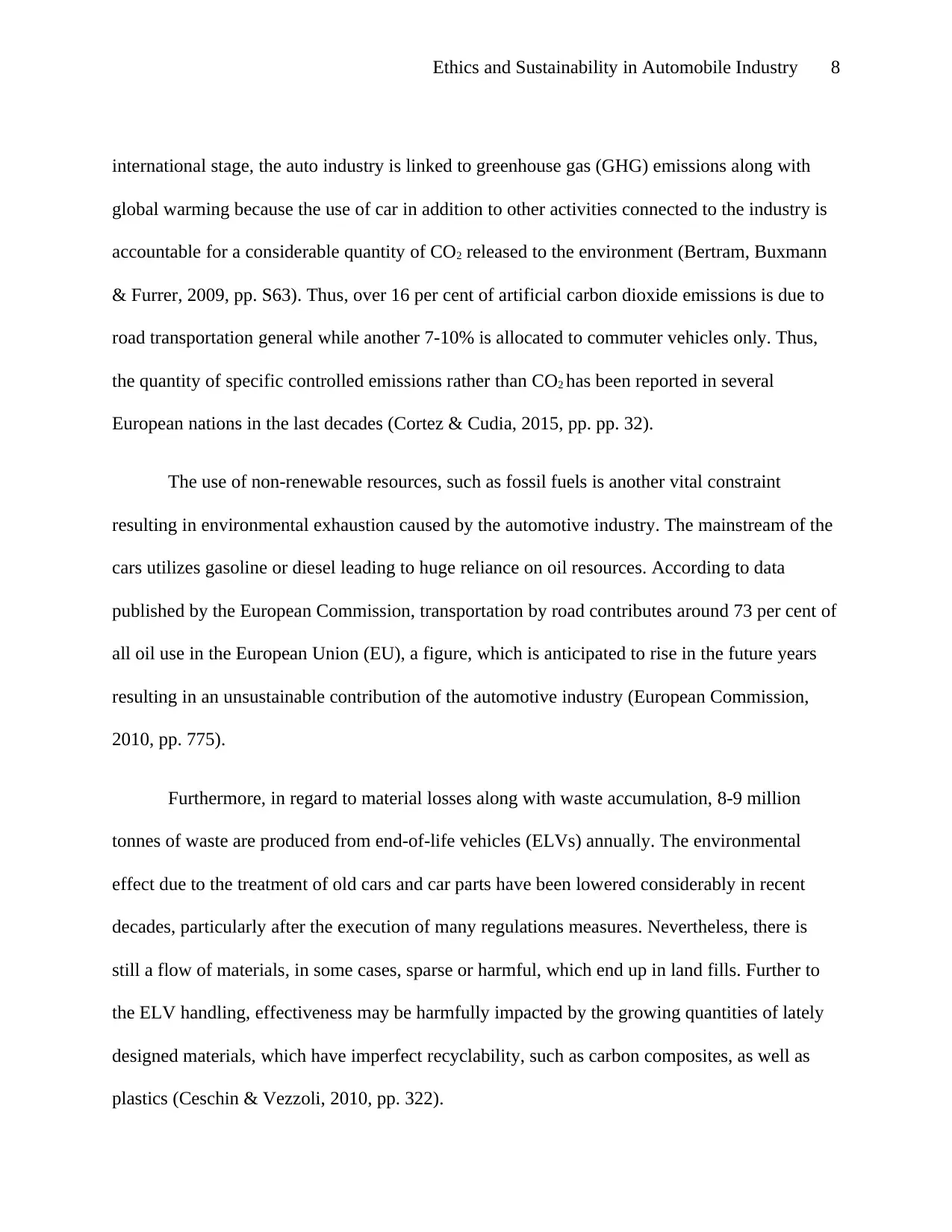
Ethics and Sustainability in Automobile Industry 8
international stage, the auto industry is linked to greenhouse gas (GHG) emissions along with
global warming because the use of car in addition to other activities connected to the industry is
accountable for a considerable quantity of CO2 released to the environment (Bertram, Buxmann
& Furrer, 2009, pp. S63). Thus, over 16 per cent of artificial carbon dioxide emissions is due to
road transportation general while another 7-10% is allocated to commuter vehicles only. Thus,
the quantity of specific controlled emissions rather than CO2 has been reported in several
European nations in the last decades (Cortez & Cudia, 2015, pp. pp. 32).
The use of non-renewable resources, such as fossil fuels is another vital constraint
resulting in environmental exhaustion caused by the automotive industry. The mainstream of the
cars utilizes gasoline or diesel leading to huge reliance on oil resources. According to data
published by the European Commission, transportation by road contributes around 73 per cent of
all oil use in the European Union (EU), a figure, which is anticipated to rise in the future years
resulting in an unsustainable contribution of the automotive industry (European Commission,
2010, pp. 775).
Furthermore, in regard to material losses along with waste accumulation, 8-9 million
tonnes of waste are produced from end-of-life vehicles (ELVs) annually. The environmental
effect due to the treatment of old cars and car parts have been lowered considerably in recent
decades, particularly after the execution of many regulations measures. Nevertheless, there is
still a flow of materials, in some cases, sparse or harmful, which end up in land fills. Further to
the ELV handling, effectiveness may be harmfully impacted by the growing quantities of lately
designed materials, which have imperfect recyclability, such as carbon composites, as well as
plastics (Ceschin & Vezzoli, 2010, pp. 322).
international stage, the auto industry is linked to greenhouse gas (GHG) emissions along with
global warming because the use of car in addition to other activities connected to the industry is
accountable for a considerable quantity of CO2 released to the environment (Bertram, Buxmann
& Furrer, 2009, pp. S63). Thus, over 16 per cent of artificial carbon dioxide emissions is due to
road transportation general while another 7-10% is allocated to commuter vehicles only. Thus,
the quantity of specific controlled emissions rather than CO2 has been reported in several
European nations in the last decades (Cortez & Cudia, 2015, pp. pp. 32).
The use of non-renewable resources, such as fossil fuels is another vital constraint
resulting in environmental exhaustion caused by the automotive industry. The mainstream of the
cars utilizes gasoline or diesel leading to huge reliance on oil resources. According to data
published by the European Commission, transportation by road contributes around 73 per cent of
all oil use in the European Union (EU), a figure, which is anticipated to rise in the future years
resulting in an unsustainable contribution of the automotive industry (European Commission,
2010, pp. 775).
Furthermore, in regard to material losses along with waste accumulation, 8-9 million
tonnes of waste are produced from end-of-life vehicles (ELVs) annually. The environmental
effect due to the treatment of old cars and car parts have been lowered considerably in recent
decades, particularly after the execution of many regulations measures. Nevertheless, there is
still a flow of materials, in some cases, sparse or harmful, which end up in land fills. Further to
the ELV handling, effectiveness may be harmfully impacted by the growing quantities of lately
designed materials, which have imperfect recyclability, such as carbon composites, as well as
plastics (Ceschin & Vezzoli, 2010, pp. 322).
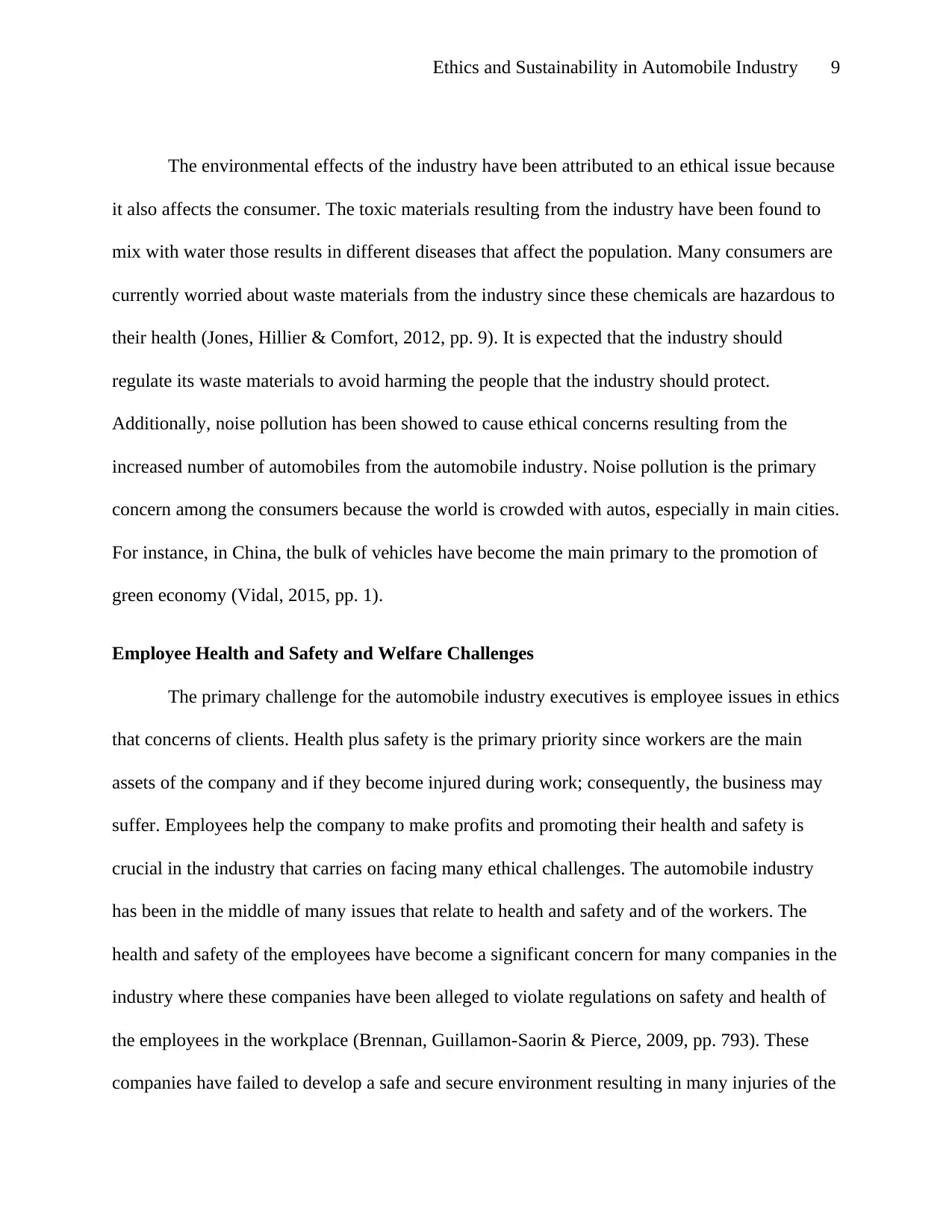
Ethics and Sustainability in Automobile Industry 9
The environmental effects of the industry have been attributed to an ethical issue because
it also affects the consumer. The toxic materials resulting from the industry have been found to
mix with water those results in different diseases that affect the population. Many consumers are
currently worried about waste materials from the industry since these chemicals are hazardous to
their health (Jones, Hillier & Comfort, 2012, pp. 9). It is expected that the industry should
regulate its waste materials to avoid harming the people that the industry should protect.
Additionally, noise pollution has been showed to cause ethical concerns resulting from the
increased number of automobiles from the automobile industry. Noise pollution is the primary
concern among the consumers because the world is crowded with autos, especially in main cities.
For instance, in China, the bulk of vehicles have become the main primary to the promotion of
green economy (Vidal, 2015, pp. 1).
Employee Health and Safety and Welfare Challenges
The primary challenge for the automobile industry executives is employee issues in ethics
that concerns of clients. Health plus safety is the primary priority since workers are the main
assets of the company and if they become injured during work; consequently, the business may
suffer. Employees help the company to make profits and promoting their health and safety is
crucial in the industry that carries on facing many ethical challenges. The automobile industry
has been in the middle of many issues that relate to health and safety and of the workers. The
health and safety of the employees have become a significant concern for many companies in the
industry where these companies have been alleged to violate regulations on safety and health of
the employees in the workplace (Brennan, Guillamon-Saorin & Pierce, 2009, pp. 793). These
companies have failed to develop a safe and secure environment resulting in many injuries of the
The environmental effects of the industry have been attributed to an ethical issue because
it also affects the consumer. The toxic materials resulting from the industry have been found to
mix with water those results in different diseases that affect the population. Many consumers are
currently worried about waste materials from the industry since these chemicals are hazardous to
their health (Jones, Hillier & Comfort, 2012, pp. 9). It is expected that the industry should
regulate its waste materials to avoid harming the people that the industry should protect.
Additionally, noise pollution has been showed to cause ethical concerns resulting from the
increased number of automobiles from the automobile industry. Noise pollution is the primary
concern among the consumers because the world is crowded with autos, especially in main cities.
For instance, in China, the bulk of vehicles have become the main primary to the promotion of
green economy (Vidal, 2015, pp. 1).
Employee Health and Safety and Welfare Challenges
The primary challenge for the automobile industry executives is employee issues in ethics
that concerns of clients. Health plus safety is the primary priority since workers are the main
assets of the company and if they become injured during work; consequently, the business may
suffer. Employees help the company to make profits and promoting their health and safety is
crucial in the industry that carries on facing many ethical challenges. The automobile industry
has been in the middle of many issues that relate to health and safety and of the workers. The
health and safety of the employees have become a significant concern for many companies in the
industry where these companies have been alleged to violate regulations on safety and health of
the employees in the workplace (Brennan, Guillamon-Saorin & Pierce, 2009, pp. 793). These
companies have failed to develop a safe and secure environment resulting in many injuries of the
⊘ This is a preview!⊘
Do you want full access?
Subscribe today to unlock all pages.

Trusted by 1+ million students worldwide
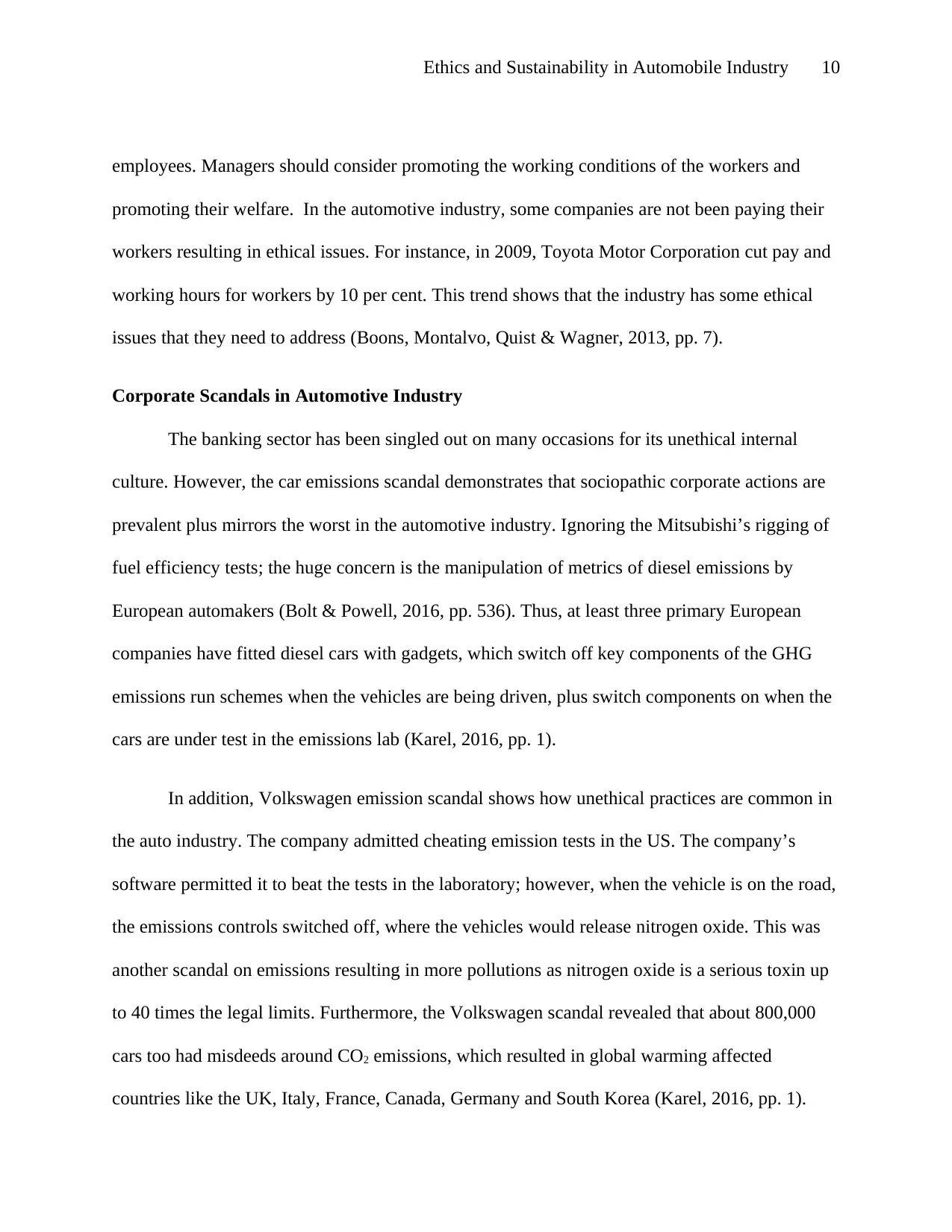
Ethics and Sustainability in Automobile Industry 10
employees. Managers should consider promoting the working conditions of the workers and
promoting their welfare. In the automotive industry, some companies are not been paying their
workers resulting in ethical issues. For instance, in 2009, Toyota Motor Corporation cut pay and
working hours for workers by 10 per cent. This trend shows that the industry has some ethical
issues that they need to address (Boons, Montalvo, Quist & Wagner, 2013, pp. 7).
Corporate Scandals in Automotive Industry
The banking sector has been singled out on many occasions for its unethical internal
culture. However, the car emissions scandal demonstrates that sociopathic corporate actions are
prevalent plus mirrors the worst in the automotive industry. Ignoring the Mitsubishi’s rigging of
fuel efficiency tests; the huge concern is the manipulation of metrics of diesel emissions by
European automakers (Bolt & Powell, 2016, pp. 536). Thus, at least three primary European
companies have fitted diesel cars with gadgets, which switch off key components of the GHG
emissions run schemes when the vehicles are being driven, plus switch components on when the
cars are under test in the emissions lab (Karel, 2016, pp. 1).
In addition, Volkswagen emission scandal shows how unethical practices are common in
the auto industry. The company admitted cheating emission tests in the US. The company’s
software permitted it to beat the tests in the laboratory; however, when the vehicle is on the road,
the emissions controls switched off, where the vehicles would release nitrogen oxide. This was
another scandal on emissions resulting in more pollutions as nitrogen oxide is a serious toxin up
to 40 times the legal limits. Furthermore, the Volkswagen scandal revealed that about 800,000
cars too had misdeeds around CO2 emissions, which resulted in global warming affected
countries like the UK, Italy, France, Canada, Germany and South Korea (Karel, 2016, pp. 1).
employees. Managers should consider promoting the working conditions of the workers and
promoting their welfare. In the automotive industry, some companies are not been paying their
workers resulting in ethical issues. For instance, in 2009, Toyota Motor Corporation cut pay and
working hours for workers by 10 per cent. This trend shows that the industry has some ethical
issues that they need to address (Boons, Montalvo, Quist & Wagner, 2013, pp. 7).
Corporate Scandals in Automotive Industry
The banking sector has been singled out on many occasions for its unethical internal
culture. However, the car emissions scandal demonstrates that sociopathic corporate actions are
prevalent plus mirrors the worst in the automotive industry. Ignoring the Mitsubishi’s rigging of
fuel efficiency tests; the huge concern is the manipulation of metrics of diesel emissions by
European automakers (Bolt & Powell, 2016, pp. 536). Thus, at least three primary European
companies have fitted diesel cars with gadgets, which switch off key components of the GHG
emissions run schemes when the vehicles are being driven, plus switch components on when the
cars are under test in the emissions lab (Karel, 2016, pp. 1).
In addition, Volkswagen emission scandal shows how unethical practices are common in
the auto industry. The company admitted cheating emission tests in the US. The company’s
software permitted it to beat the tests in the laboratory; however, when the vehicle is on the road,
the emissions controls switched off, where the vehicles would release nitrogen oxide. This was
another scandal on emissions resulting in more pollutions as nitrogen oxide is a serious toxin up
to 40 times the legal limits. Furthermore, the Volkswagen scandal revealed that about 800,000
cars too had misdeeds around CO2 emissions, which resulted in global warming affected
countries like the UK, Italy, France, Canada, Germany and South Korea (Karel, 2016, pp. 1).
Paraphrase This Document
Need a fresh take? Get an instant paraphrase of this document with our AI Paraphraser
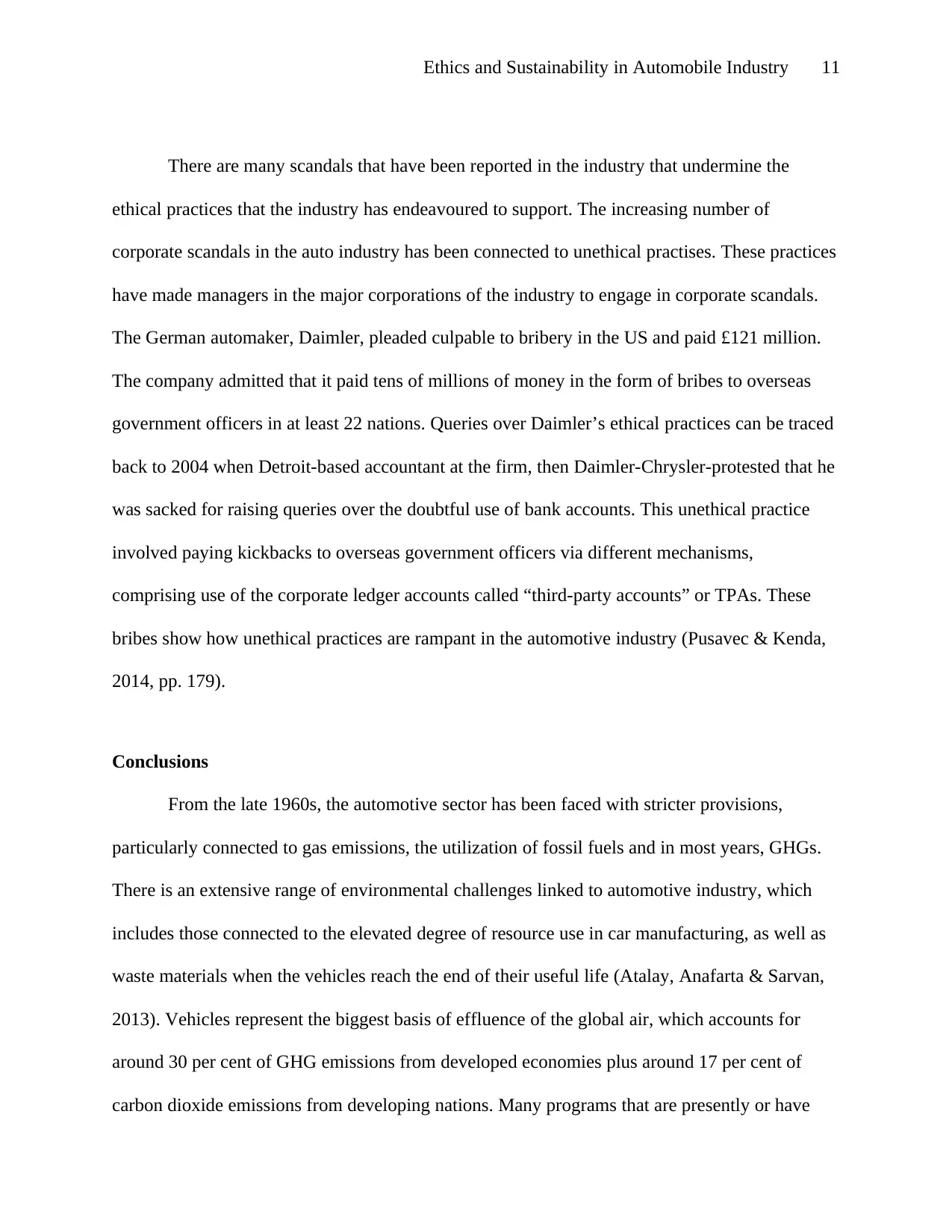
Ethics and Sustainability in Automobile Industry 11
There are many scandals that have been reported in the industry that undermine the
ethical practices that the industry has endeavoured to support. The increasing number of
corporate scandals in the auto industry has been connected to unethical practises. These practices
have made managers in the major corporations of the industry to engage in corporate scandals.
The German automaker, Daimler, pleaded culpable to bribery in the US and paid £121 million.
The company admitted that it paid tens of millions of money in the form of bribes to overseas
government officers in at least 22 nations. Queries over Daimler’s ethical practices can be traced
back to 2004 when Detroit-based accountant at the firm, then Daimler-Chrysler-protested that he
was sacked for raising queries over the doubtful use of bank accounts. This unethical practice
involved paying kickbacks to overseas government officers via different mechanisms,
comprising use of the corporate ledger accounts called “third-party accounts” or TPAs. These
bribes show how unethical practices are rampant in the automotive industry (Pusavec & Kenda,
2014, pp. 179).
Conclusions
From the late 1960s, the automotive sector has been faced with stricter provisions,
particularly connected to gas emissions, the utilization of fossil fuels and in most years, GHGs.
There is an extensive range of environmental challenges linked to automotive industry, which
includes those connected to the elevated degree of resource use in car manufacturing, as well as
waste materials when the vehicles reach the end of their useful life (Atalay, Anafarta & Sarvan,
2013). Vehicles represent the biggest basis of effluence of the global air, which accounts for
around 30 per cent of GHG emissions from developed economies plus around 17 per cent of
carbon dioxide emissions from developing nations. Many programs that are presently or have
There are many scandals that have been reported in the industry that undermine the
ethical practices that the industry has endeavoured to support. The increasing number of
corporate scandals in the auto industry has been connected to unethical practises. These practices
have made managers in the major corporations of the industry to engage in corporate scandals.
The German automaker, Daimler, pleaded culpable to bribery in the US and paid £121 million.
The company admitted that it paid tens of millions of money in the form of bribes to overseas
government officers in at least 22 nations. Queries over Daimler’s ethical practices can be traced
back to 2004 when Detroit-based accountant at the firm, then Daimler-Chrysler-protested that he
was sacked for raising queries over the doubtful use of bank accounts. This unethical practice
involved paying kickbacks to overseas government officers via different mechanisms,
comprising use of the corporate ledger accounts called “third-party accounts” or TPAs. These
bribes show how unethical practices are rampant in the automotive industry (Pusavec & Kenda,
2014, pp. 179).
Conclusions
From the late 1960s, the automotive sector has been faced with stricter provisions,
particularly connected to gas emissions, the utilization of fossil fuels and in most years, GHGs.
There is an extensive range of environmental challenges linked to automotive industry, which
includes those connected to the elevated degree of resource use in car manufacturing, as well as
waste materials when the vehicles reach the end of their useful life (Atalay, Anafarta & Sarvan,
2013). Vehicles represent the biggest basis of effluence of the global air, which accounts for
around 30 per cent of GHG emissions from developed economies plus around 17 per cent of
carbon dioxide emissions from developing nations. Many programs that are presently or have
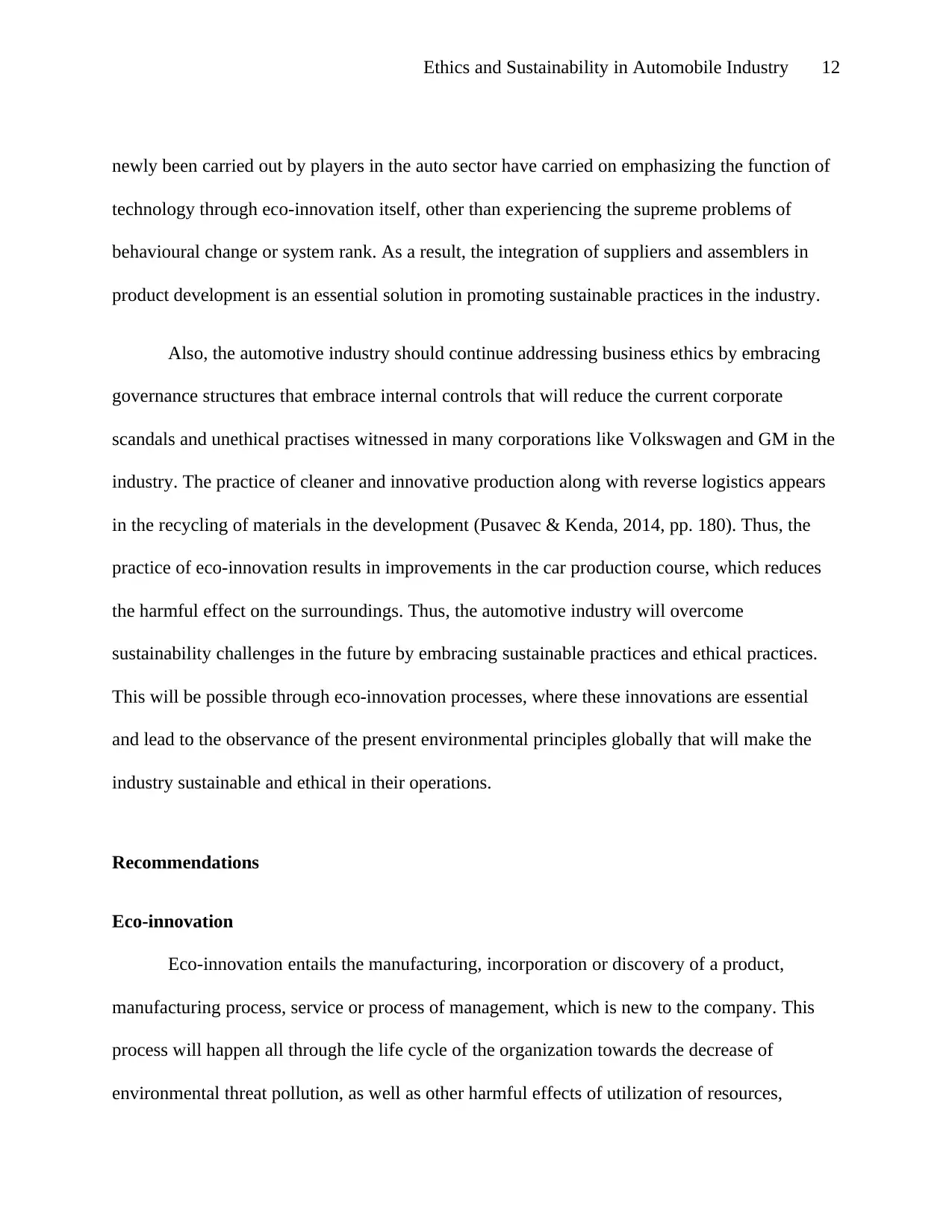
Ethics and Sustainability in Automobile Industry 12
newly been carried out by players in the auto sector have carried on emphasizing the function of
technology through eco-innovation itself, other than experiencing the supreme problems of
behavioural change or system rank. As a result, the integration of suppliers and assemblers in
product development is an essential solution in promoting sustainable practices in the industry.
Also, the automotive industry should continue addressing business ethics by embracing
governance structures that embrace internal controls that will reduce the current corporate
scandals and unethical practises witnessed in many corporations like Volkswagen and GM in the
industry. The practice of cleaner and innovative production along with reverse logistics appears
in the recycling of materials in the development (Pusavec & Kenda, 2014, pp. 180). Thus, the
practice of eco-innovation results in improvements in the car production course, which reduces
the harmful effect on the surroundings. Thus, the automotive industry will overcome
sustainability challenges in the future by embracing sustainable practices and ethical practices.
This will be possible through eco-innovation processes, where these innovations are essential
and lead to the observance of the present environmental principles globally that will make the
industry sustainable and ethical in their operations.
Recommendations
Eco-innovation
Eco-innovation entails the manufacturing, incorporation or discovery of a product,
manufacturing process, service or process of management, which is new to the company. This
process will happen all through the life cycle of the organization towards the decrease of
environmental threat pollution, as well as other harmful effects of utilization of resources,
newly been carried out by players in the auto sector have carried on emphasizing the function of
technology through eco-innovation itself, other than experiencing the supreme problems of
behavioural change or system rank. As a result, the integration of suppliers and assemblers in
product development is an essential solution in promoting sustainable practices in the industry.
Also, the automotive industry should continue addressing business ethics by embracing
governance structures that embrace internal controls that will reduce the current corporate
scandals and unethical practises witnessed in many corporations like Volkswagen and GM in the
industry. The practice of cleaner and innovative production along with reverse logistics appears
in the recycling of materials in the development (Pusavec & Kenda, 2014, pp. 180). Thus, the
practice of eco-innovation results in improvements in the car production course, which reduces
the harmful effect on the surroundings. Thus, the automotive industry will overcome
sustainability challenges in the future by embracing sustainable practices and ethical practices.
This will be possible through eco-innovation processes, where these innovations are essential
and lead to the observance of the present environmental principles globally that will make the
industry sustainable and ethical in their operations.
Recommendations
Eco-innovation
Eco-innovation entails the manufacturing, incorporation or discovery of a product,
manufacturing process, service or process of management, which is new to the company. This
process will happen all through the life cycle of the organization towards the decrease of
environmental threat pollution, as well as other harmful effects of utilization of resources,
⊘ This is a preview!⊘
Do you want full access?
Subscribe today to unlock all pages.

Trusted by 1+ million students worldwide
1 out of 22
Related Documents
Your All-in-One AI-Powered Toolkit for Academic Success.
+13062052269
info@desklib.com
Available 24*7 on WhatsApp / Email
![[object Object]](/_next/static/media/star-bottom.7253800d.svg)
Unlock your academic potential
Copyright © 2020–2026 A2Z Services. All Rights Reserved. Developed and managed by ZUCOL.





